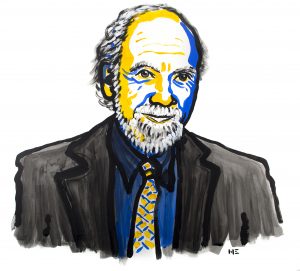
Prof Barry Barish. Image credit: Nobel Media AB 2017
This is a bonus edition of Pythagorean Astronomy – the regular June 2018 episode will be published on Thursday 28th June.
In May 2018 we welcomed to Cardiff a Nobel Prize winner: Professor Barry Barish, who was one of the scientists who founded the LIGO Scientific Collaboration, As regular listeners will remember, LIGO made the first direct detection of gravitational waves a few years ago. Barry’s been involved with the experiments for many years, and as such was one of three recipients of the Nobel Prize for Physics in 2017 for significant contributions to the detection of gravitational waves.
Barry was in town to give a public talk, part of the launch of the Gravity Exploration Institute here at Cardiff University. While he was here, I teamed up with one of our PhD students, Jeni Millard, who is a presenter on the Awesome Astronomy podcast, to grab some time with Barry and speak about all things LIGO.
We talked to Barry for about an hour – in case you want to skip to a particular section, here’s a rough running order:
- 0:00:00 – Introduction
- 0:01:30 – The transition from particle physics to gravitational waves
- 0:07:10 – Technological challenges in LIGO’s early days
- 0:15:30 – Initial expectations for detecting gravitational waves
- 0:18:20 – Unrealised technological improvements (cryogenic detectors)
- 0:22:10 – Comparison of the field with exoplanet detection
- 0:23:50 – What Barry would do with unlimited funds!
- 0:27:00 – The forgotten third LIGO – and LIGO India!
- 0:30:30 – The first detection – Barry’s reaction
- 0:46:30 – Receiving the Nobel Prize from a winner’s perspective
- 1:02:20 – What’s changed since winning the prize
A bonus edition of Pythagorean Astronomy.
Don’t forget you can now subscribe to the podcast. For an archive of Pythagorean Astronomy, visit pythagastro.uk.





